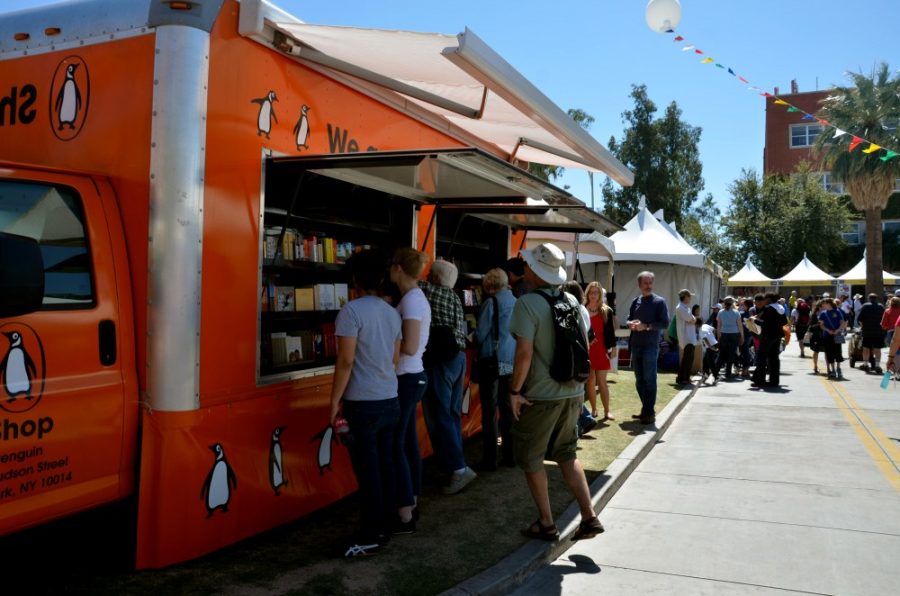The setup of dozens of white tents on the UA campus every March can only mean one thing: the Tucson Festival of Books is back.
To some students, these white tents may represent an inconvenience or an obstacle on the walk to class. But for event organizers, the white tents mark the beginning of something much bigger — a year’s worth of hard work coming to fruition.
Planning for the event happens year-round, beginning with author selection in late spring and summer and the meeting of the operations committee once a month, every month. According to Chris Kopach, assistant vice president of facilities management, everything, from mapping out where the tents go on the UA Mall to coordinating plumbing and electrical, has to be meticulously planned in order for the event to run smoothly.
“There are all the departments within the university that work together to make this happen — the University of Arizona and the departments working as one,” Kopach said. “And that’s probably the key: working as one to really have a top notch, world-class book festival — one of the largest in the country. It’s a great effort. It wouldn’t work if we didn’t have a great team, and everybody just does an outstanding job.”
All of the hard work that goes on behind the scenes is what allows the Tucson Festival of Books to grow each year. Kopach said that in its first year the event had around 50,000 people attend. Last year, there were nearly 130,000.
Despite the event’s continual growth, it has always remained free to the public. Helene Woodhams, co-chair of the festival’s author committee, said that once operating expenses are covered, the rest of the money goes to charity.
“All proceeds from the festival go to literacy initiatives in Southern Arizona,” she said. “But I think on an equally important level, we’re helping to establish Tucson in the eyes of the nation as a place where people value books and people value reading and they want to hear authors. That’s a tremendous way for a community to be viewed.”
The Tucson Festival of Books is a reflection of the growth of the of love for books in the community. In 2015, Amazon.com announced the most read cities in America based on sales data of books, magazine and newspaper sales from April 2014 to April 2015. Tucson was ranked fourth out of the list of 20.
Woodhams said she likes the idea that this is Tucson’s image.
“When people look at your community, what do you want to see reflected? I like the idea that people see that we’re into books, we’re into authors, we’re into getting together and talking about it,” she said.
The Tucson Festival of Books not only works to promote this growing appreciation for books. Kopach said that even having the event on the UA campus sends a strong message to young students. On top of that, both Kopach and Woodhams said that over $1 million has gone to literacy-promoting charities such as the Stocker Foundation.
The Tucson economy also benefits from the event. Woodhams, who is also a librarian, said that she encounters many people who say they plan their winter trips to Tucson around the festival.
“I think anything that brings people to Tucson — whether it’s the gem show or the rodeo or golf classics — if it brings people to Tucson it’s a good thing,” she said. “It’s wonderful for the economy.”
The reoccurrence of the festival each year has allowed for increased event functionality on the the Mall. Kopach said that permanent wheelchair ramps and better electrical design have been installed — features that help other Mall events such as Spring Fling.
The Tucson Festival of Books has influenced a multitude of facets of the community from growth in appreciation of books and literature to increased literacy initiatives in Southern Arizona, to increased event functionality and the creation of jobs.
For more coverage on the Tucson Festival of Books, pick up the Daily Wildcat on Friday.
Follow Leah Merrall on Twitter.









